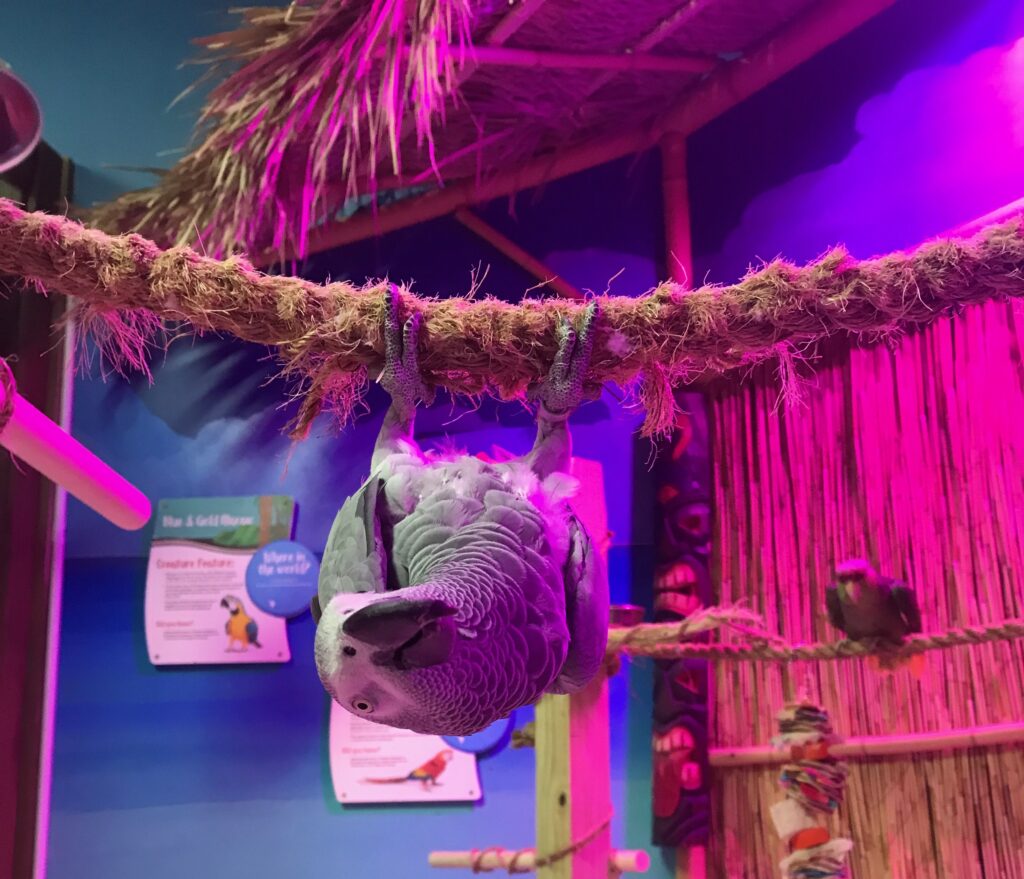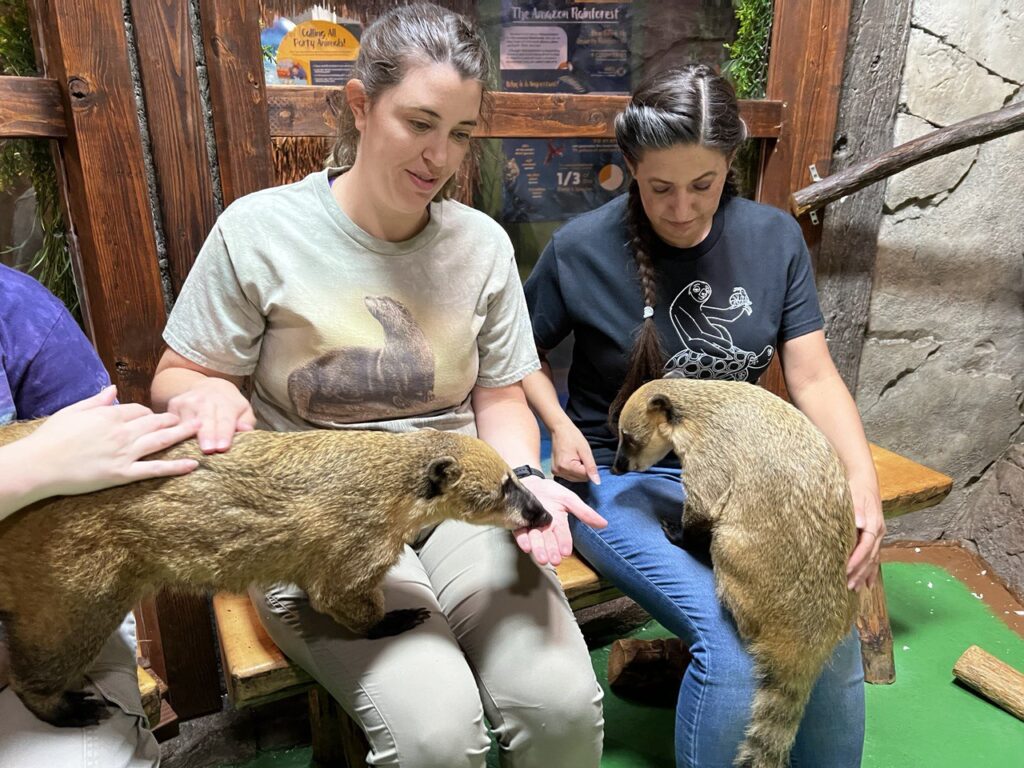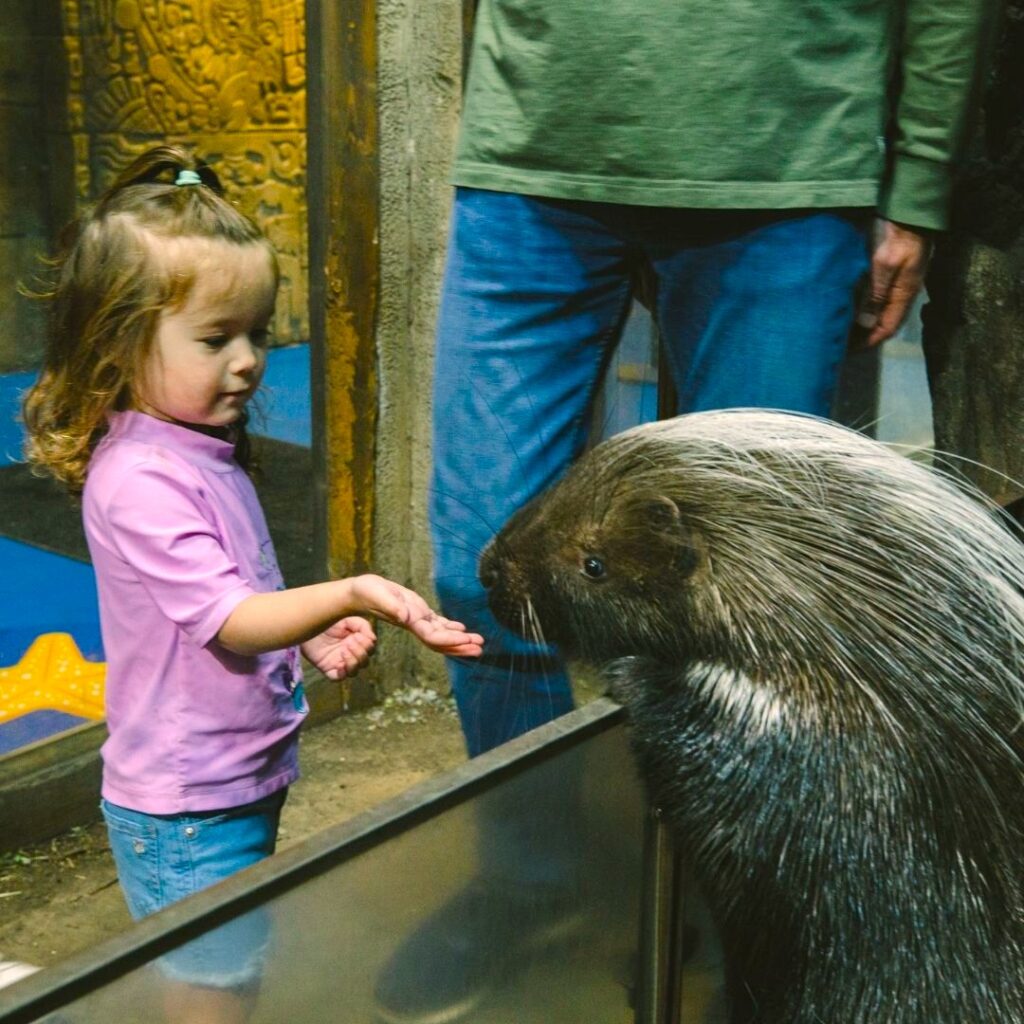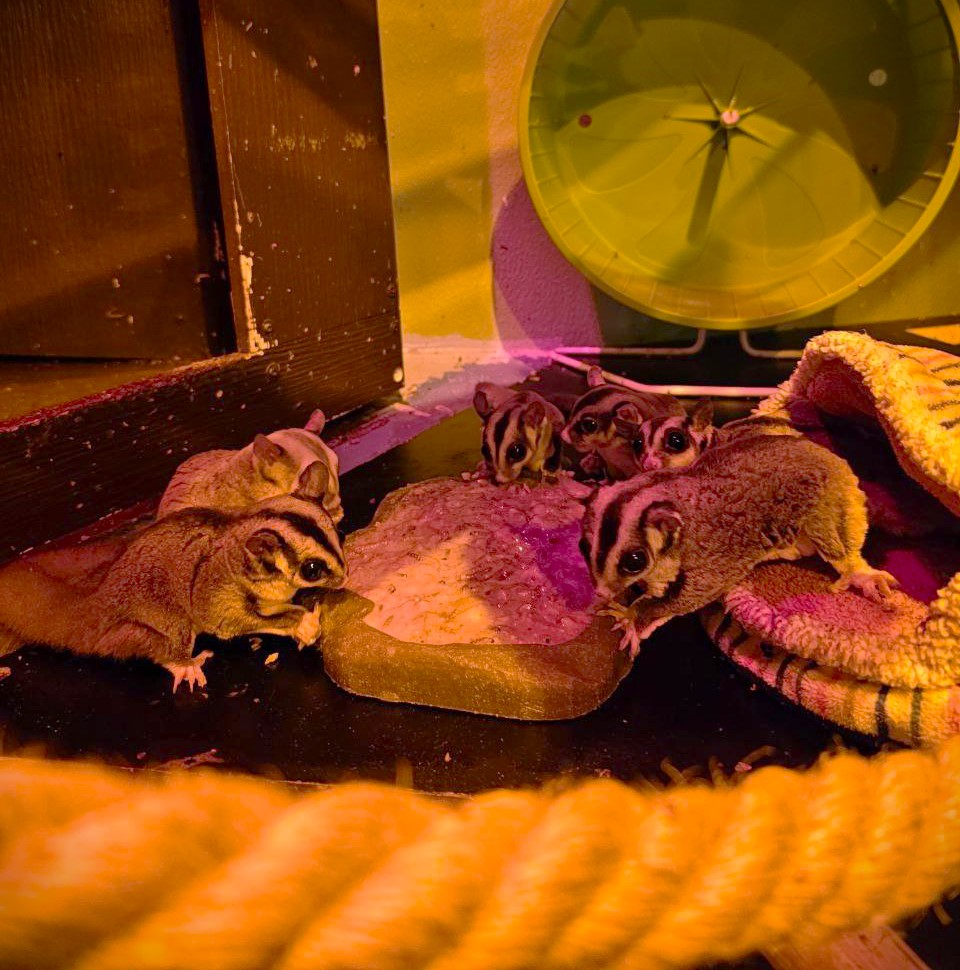How Are the Parrots at SeaQuest Cared For?
Share it on:
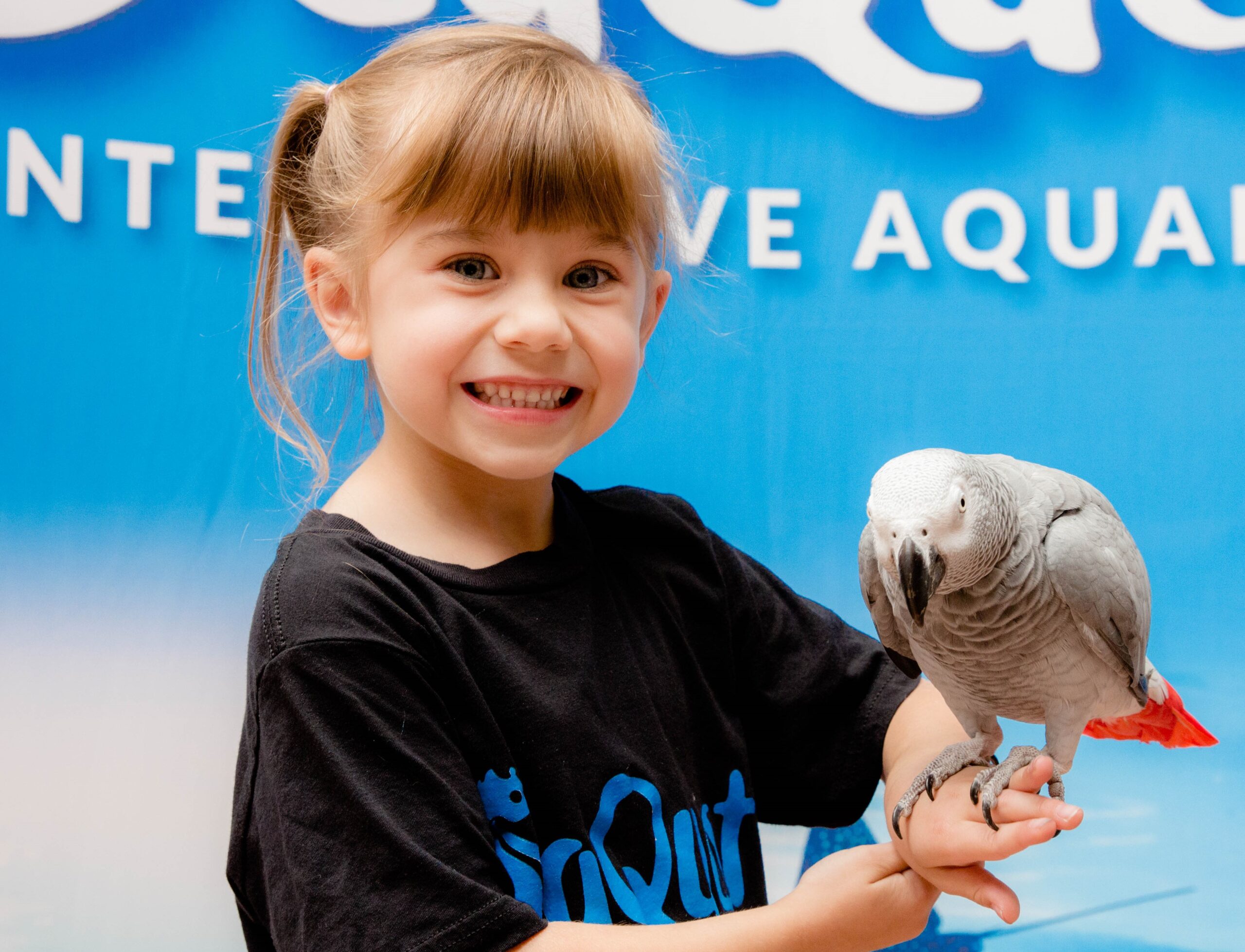
For centuries, humans have admired the colorful winged friends that take to the sky: Parrots! From specialized diets to enrichment activities, SeaQuest prides itself on the high standard of care we provide for our feathered friends. Let’s cover the details of this kind of care and what you can expect from the parrot exhibits when visiting.
Introduction to Parrot Care at SeaQuest
SeaQuest houses various exotic birds, many of whom are part of the parrot family. These birds are brilliant and social creatures, and our care aims to fulfill their basic needs and elevate their quality of life from what they would traditionally have in the wild. With a comprehensive approach to their daily lives, we provide a variety of enrichment activities that engage their instincts, such as puzzle-solving and foraging activities. We also foster an environment where parrots can interact with one another and have space to spread their wings and rest. A team of veterinary staff and internal care specialists work to develop a customized plan that meets every bird’s mental, physical, and social needs.
Through our guest interactions, we can educate the public about the importance of these birds and the dangers they face in the wild. We hope that any visitor leaving SeaQuest learns to appreciate these wondrous birds and how they can help preserve their natural habitat. The more we do this, the more fulfilling lives the parrot species as a whole will have.
What Is a Parrot’s Natural Habitat?
Parrots—including cockatiels, cockatoos, macaws, parakeets, and budgies—live worldwide but are predominantly found in South America, the South Pacific islands, Australia, and Africa. Depending on the sub-species, parrots can live in various ecosystems, such as grasslands, deserts, woodlands, and rainforests.
In these environments, birds flock and fly together, building nests from natural fibers, vegetation, and other items they find. SeaQuest meticulously designs the aviaries to mimic these environments. We have climate control systems that replicate the required humidity and temperature of the parrot’s home environment. Each aviary has a wide variety of tropical plants and trees that provide perching stations for parrots to roost and plenty of stimulation for birds to search for nesting materials. These stations can help parrots maintain daily hygiene by sharpening their beaks and claws.
What Social Interaction and Enrichment Do Parrots Receive?
In the wild, parrots often form tight-knit flocks, which provide security, companionship, and the means to learn from one another. For example, parrots often learn places to forage and solve puzzles by looking to their peer group for guidance. Because of this, parrots’ mental and physical well-being is highly dependent on their social structures, making it a high priority for SeaQuest animal care.
SeaQuest facilitates healthy social structures by creating the space to allow these natural flock dynamics and prevent stress and behavioral issues. Parrots can participate in regular grooming, communicate, and play with one another in these settings.
We also provide daily enrichment activities and toys for parrots to play with, which exercise their intelligence and replace natural foraging behaviors. For example, our animal caretakers hide their meals and food throughout the enclosure to encourage them to forage for food. These exercises allow for our parrots’ social well-being and help prevent unhealthy behaviors such as excessive feather plucking, social anxiety, and aggressive behavior.
What Do Parrots Eat?
In the wild, parrots eat a highly seasonal diet that mainly consists of various vegetables, fruits, nuts, seeds, and insects. So, for foraging, we typically place a wide range of papaya, mango, berries, and vegetables like carrots, sweet potatoes, and lettuce throughout the aviary. We’ll also offer a generous amount of nuts and seeds, which Parrots love to snack on throughout the day.
Since we house a variety of birds that belong to the parrot family, we also understand that parrots have differing preferences for their food and meals. Our wildlife team and animal nutritionists will evaluate each bird’s health and provide pellets that may compensate for any nutritional deficiencies. These pellets contain a blend of necessary nutrients and vitamins that are the required daily intake.
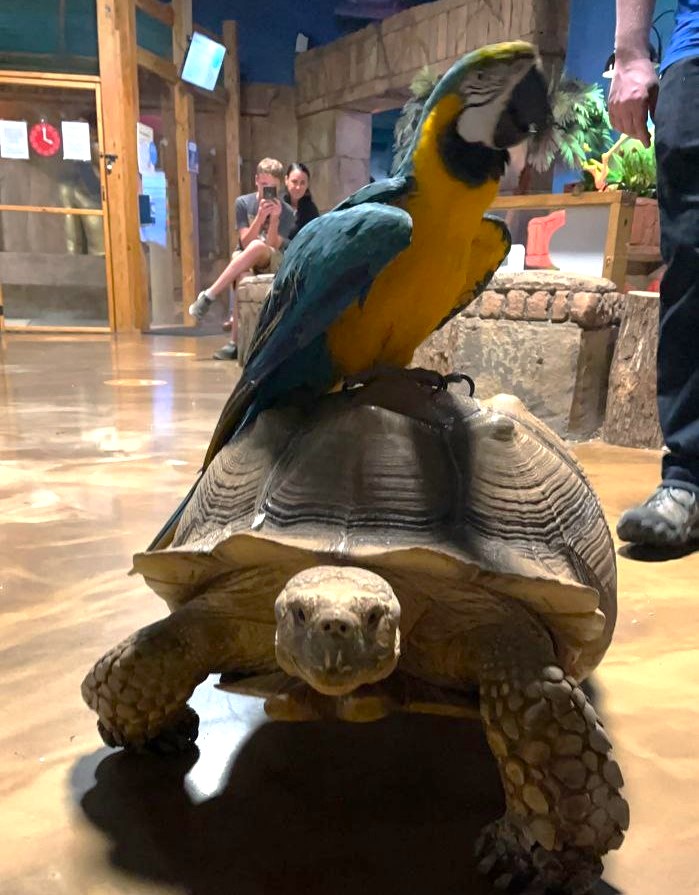
Our Parrot and Sulcata Tortoise take a walk around SeaQuest together!
Veterinary Care and Preventive Health Measures for Parrots
Routine health assessments are a cornerstone of the veterinary care program at SeaQuest. Our wildlife team assesses each parrot through a physical exam, weight monitoring, a nutritional needs assessment, and preventative care. Preventive care also extends to vaccinations and regular parasite control treatments, which maintain the health of each bird and prevent the spread of disease among the rest of the avian community at SeaQuest.
We conduct these assessments regularly to catch potential issues early before they become severe. These assessments are stress-free for our parrots, as we rely on non-invasive diagnostic tools such as digital imaging and blood tests. We perform these techniques quickly and efficiently to reduce the impact on the birds. These tools provide valuable insights into the health status of the parrots without the need for more stressful and invasive procedures.
Creating Optimal Living Conditions
Our enclosures are kept clean on a strict schedule to prevent the spread of disease and maintain the parameters for each animal’s living space. We remove waste, uneaten food, and other contaminated items regularly, preventing the buildup of bacteria that could cause viruses in our avian community. All structures in the aviary are checked for stability to ensure they are non-toxic and safe for parrots to reside in.
SeaQuest’s Role in Parrot Education and Conservation
Although we prioritize our parrots’ well-being, we know that the best way to preserve the species’ well-being is through public education. Guests are informed about our animal residents during their SeaQuest visit, including the wild habits of parrots, their ecological role, their social structures, and their cognitive abilities. We pay particular attention to the fact that the ecological role of parrots has diminished in the past several decades due to deforestation and the loss of native habitats throughout the globe. By learning about these growing issues and the importance of parrots, our visitors leave with a newfound appreciation of the animals and will feel motivated to help out with the threats they face.
We also teach guests about current SeaQuest conservation efforts. By partnering with other international wildlife organizations, we support habitat restoration projects that aim to repopulate endangered species of parrots. SeaQuest rescues exotic birds and rehabilitates them in a safe and loving environment. We offer guided tours through the exhibits where guests can observe the daily lives of our parrots, including their feeding, training, and different enrichment activities. They can also interact with the birds directly under strict supervision and guidance from staff. This benefits the birds by providing opportunities for socialization, and guests can gain a newfound appreciation for parrots that most people won’t receive in a traditional visit to the zoo or other organizations.
SeaQuest will continue to inspire other institutions and individuals to adopt similar practices, contributing to the global efforts needed to preserve these extraordinary birds for future generations to enjoy and learn from.

